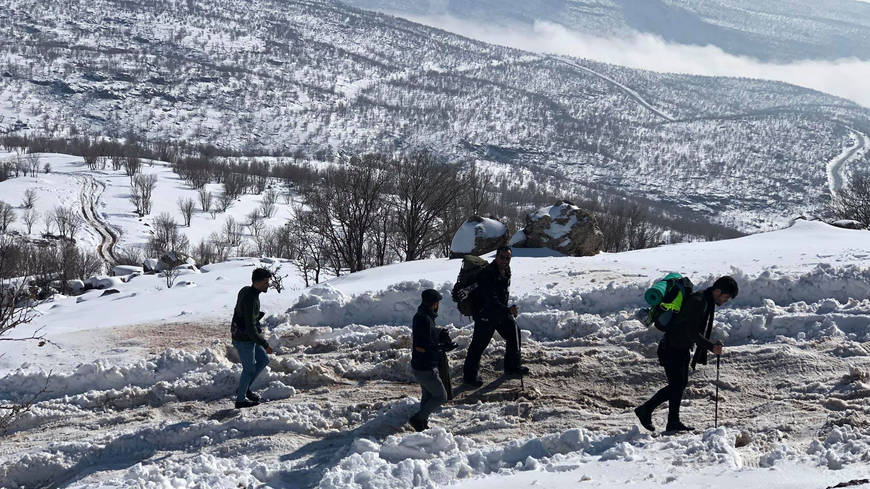From refuge to recreation, Kurdish hikers rediscover their mountains

Kurds say they have no friends but the mountains. The Zagros Mountains that zig-zag along the Iran-Iraq border have provided safety for Kurds fleeing conflict for centuries. In the 1970s, Kurdish rebel fighters, or Peshmerga, made guerilla raids against Iraq’s Baathist state from mountain strongholds. In 1988, Kurdish civilians fled their villages during the Anfal campaign and sought refuge in the mountainous and porous borders with Iran and Turkey to escape Iraqi bombs and bulldozers.
More recently, Kurds have begun to find another purpose in their mountains beyond survival: recreation. Within the last decade, Iraqi Kurdistan has experienced a boom in mountaineering and hiking groups who weather adverse conditions, including land mines and drone strikes, to go climbing on weekends. Arezoo Vaske, who founded the group Kurdistan Outdoors in Sulaimaniyah in 2013, organizes hikes on Fridays. She is inspired by how hiking bridges many divisions within society, including gender, urban-rural and political.
“It is incredible. Our group members have unified around going into nature each week. Through scaling mountains, hiking to waterfalls or crawling through caves, we have formed what I think will be lifelong bonds,” she told Al-Monitor.
Rekan Rasool, who co-founded the popular Erbil-based hiking group Rock Ur Bones in 2008, encourages people to go out and climb together. “Friendships and even marriages have started in the mountains,” he told Al-Monitor.
These hiking trips also provide opportunities to learn to appreciate and protect the natural heritage of the region. Rock Ur Bones guides begin each hike with a message about the three Rs: reduce, reuse and recycle. “Our message about conservation has helped cut down on the amount of waste we throw away after each hike, even as our membership has grown,” said Rasool.
Other groups include the Kurdistan Moutaineering and Climbing Federation, the Nawdaran Mountaineering Group and many more. The Peramagron Mountain Climbers, named after the prominent rocky massif near Sulaimaniyah, specialize in difficult mountain trekking. The group’s founder Dana Jamal told Al-Monitor, “Although Peramagron is the most recognizable mountain among locals, not many people have actually hiked it. We are working to change that through frequent trips to the mountain’s peak.” There are also informal guides who offer a range of hiking options, from a breezy stroll to the full ascent. Although trekking remains the predominant activity, these groups also organize mountain biking, river kayaking, cliff jumping and even paragliding excursions.
Amid the adventure and other rewards, there are always dangers to be aware of when hiking. And hiking in Iraqi Kurdistan has a way of both magnifying these typical hazards and exposes hikers to other dangers unique to the region. Just 10 years ago, three American hikers were taken prisoner by Iranian border guards while allegedly crossing the border during a trek around Ahmed Awaa, popular for its scenic waterfall and pistachio groves.
Iran and Iraq filled their mountainous border with mines during their nearly decade-long war with one another. That war and the 2003 US invasion left Iraq littered with land mines, cluster munitions and other unexploded ordnance, making it one of the most heavily mined countries in the world.
Earlier this year Salar Chomany, a guide who for a decade has organized tours to Halgurd Mountain, the second highest in Iraq, had to rescue a group of hikers who went out on their own and got caught in a previously undiscovered mine field. “I never take a group out to an area unless I have first gone with local authorities to make sure it is safe,” Chomany told Al-Monitor. This year, a federation of hiking groups plans to collaborate and mark the most popular trails, including Halgurd, to keep hikers safe.
Militants and drone strikes present another logistical challenge to hikers. The Kurdistan Workers Party, a Turkish Kurdish militant group, attracts Turkish drone strikes in a large swath of Halgurd-Sakran National Park, a national park that exists only on paper. In the wake of the Islamic State and the economic collapse of Iraqi Kurdistan in 2014, guides must plan ahead, researching recent skirmishes or strikes before taking groups to these popular highlands. Further to the south, it was reported that members of the Islamic State, when driven out of Mosul, fled to the rugged Hamrin Mountains as a hideaway. To mitigate the risk, the Kurdish intelligence agency Asayish has begun to require groups to apply for permits before hiking in certain areas with militant activity.
These lasting and complicated wounds of war make the emerging hiking trend all the more interesting. Former Peshmerga have come full circle and joined hikes, excited to experience in a new way the mountains where they once played a deadly game of cat-and-mouse with Saddam Hussein’s forces. On these hikes, the Peshmerga take pride in demonstrating their orienteering skills while also sharing war stories with a younger generation.
Kurds often joke that picnicking is their national sport. With the growing interest in mountaineering and hiking, there might be a new national pastime on the horizon.
“People I take out often tell me how afraid they are,” recounted Chomany. “Fear of nature or the mountain. But then they make it to the top and the fear melts away. Now they feel they can accomplish anything and can’t wait to come back hiking next week.”
With the mountain snow starting to melt as spring approaches, the iconic yellow-and-white daffodil, the harbinger of Newroz in the Kurdish world, begins to dot the countryside. Newroz, the Kurdish New Year marking the first day of spring, is around the corner and hiking season will soon be in full swing.
No matter how much Iraqi Kurdish society might evolve, some things — like the connection between the Kurds and their mountainous terrain — never seem to change.